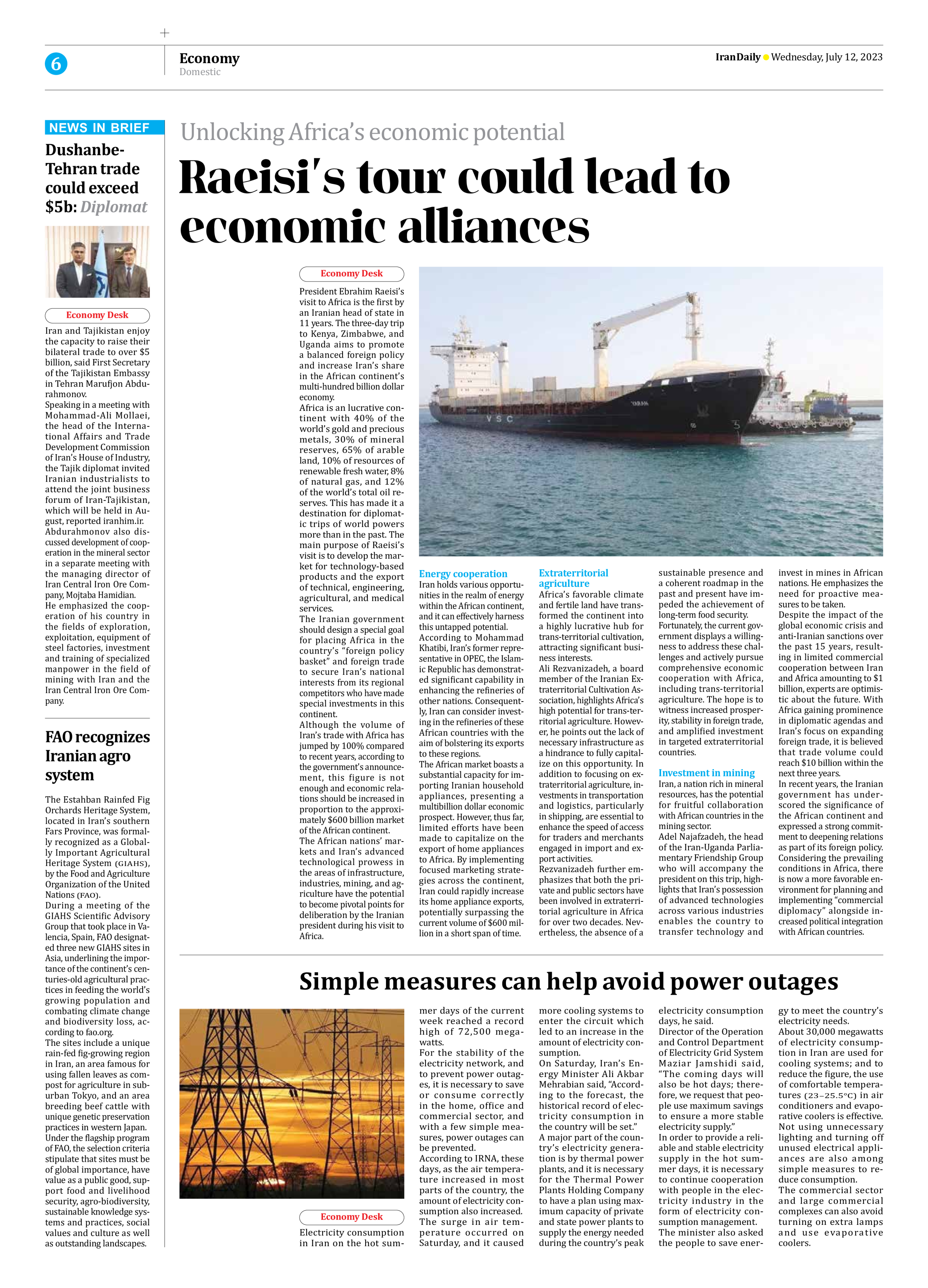
Unlocking Africa’s economic potential
Raeisi’s tour could lead to economic alliances
President Ebrahim Raeisi’s visit to Africa is the first by an Iranian head of state in 11 years. The three-day trip to Kenya, Zimbabwe, and Uganda aims to promote a balanced foreign policy and increase Iran’s share in the African continent’s multi-hundred billion dollar economy.
Africa is an lucrative continent with 40% of the world’s gold and precious metals, 30% of mineral reserves, 65% of arable land, 10% of resources of renewable fresh water, 8% of natural gas, and 12% of the world’s total oil reserves. This has made it a destination for diplomatic trips of world powers more than in the past. The main purpose of Raeisi’s visit is to develop the market for technology-based products and the export of technical, engineering, agricultural, and medical services.
The Iranian government should design a special goal for placing Africa in the country’s “foreign policy basket” and foreign trade to secure Iran’s national interests from its regional competitors who have made special investments in this continent.
Although the volume of Iran’s trade with Africa has jumped by 100% compared to recent years, according to the government’s announcement, this figure is not enough and economic relations should be increased in proportion to the approximately $600 billion market of the African continent.
The African nations’ markets and Iran’s advanced technological prowess in the areas of infrastructure, industries, mining, and agriculture have the potential to become pivotal points for deliberation by the Iranian president during his visit to Africa.
Energy cooperation
Iran holds various opportunities in the realm of energy within the African continent, and it can effectively harness this untapped potential.
According to Mohammad Khatibi, Iran’s former representative in OPEC, the Islamic Republic has demonstrated significant capability in enhancing the refineries of other nations. Consequently, Iran can consider investing in the refineries of these African countries with the aim of bolstering its exports to these regions.
The African market boasts a substantial capacity for importing Iranian household appliances, presenting a multibillion dollar economic prospect. However, thus far, limited efforts have been made to capitalize on the export of home appliances to Africa. By implementing focused marketing strategies across the continent, Iran could rapidly increase its home appliance exports, potentially surpassing the current volume of $600 million in a short span of time.
Extraterritorial agriculture
Africa’s favorable climate and fertile land have transformed the continent into a highly lucrative hub for trans-territorial cultivation, attracting significant business interests.
Ali Rezvanizadeh, a board member of the Iranian Extraterritorial Cultivation Association, highlights Africa’s high potential for trans-territorial agriculture. However, he points out the lack of necessary infrastructure as a hindrance to fully capitalize on this opportunity. In addition to focusing on extraterritorial agriculture, investments in transportation and logistics, particularly in shipping, are essential to enhance the speed of access for traders and merchants engaged in import and export activities.
Rezvanizadeh further emphasizes that both the private and public sectors have been involved in extraterritorial agriculture in Africa for over two decades. Nevertheless, the absence of a sustainable presence and a coherent roadmap in the past and present have impeded the achievement of long-term food security.
Fortunately, the current government displays a willingness to address these challenges and actively pursue comprehensive economic cooperation with Africa, including trans-territorial agriculture. The hope is to witness increased prosperity, stability in foreign trade, and amplified investment in targeted extraterritorial countries.
Investment in mining
Iran, a nation rich in mineral resources, has the potential for fruitful collaboration with African countries in the mining sector.
Adel Najafzadeh, the head of the Iran-Uganda Parliamentary Friendship Group who will accompany the president on this trip, highlights that Iran’s possession of advanced technologies across various industries enables the country to transfer technology and invest in mines in African nations. He emphasizes the need for proactive measures to be taken.
Despite the impact of the global economic crisis and anti-Iranian sanctions over the past 15 years, resulting in limited commercial cooperation between Iran and Africa amounting to $1 billion, experts are optimistic about the future. With Africa gaining prominence in diplomatic agendas and Iran’s focus on expanding foreign trade, it is believed that trade volume could reach $10 billion within the next three years.
In recent years, the Iranian government has underscored the significance of the African continent and expressed a strong commitment to deepening relations as part of its foreign policy. Considering the prevailing conditions in Africa, there is now a more favorable environment for planning and implementing “commercial diplomacy” alongside increased political integration with African countries.







